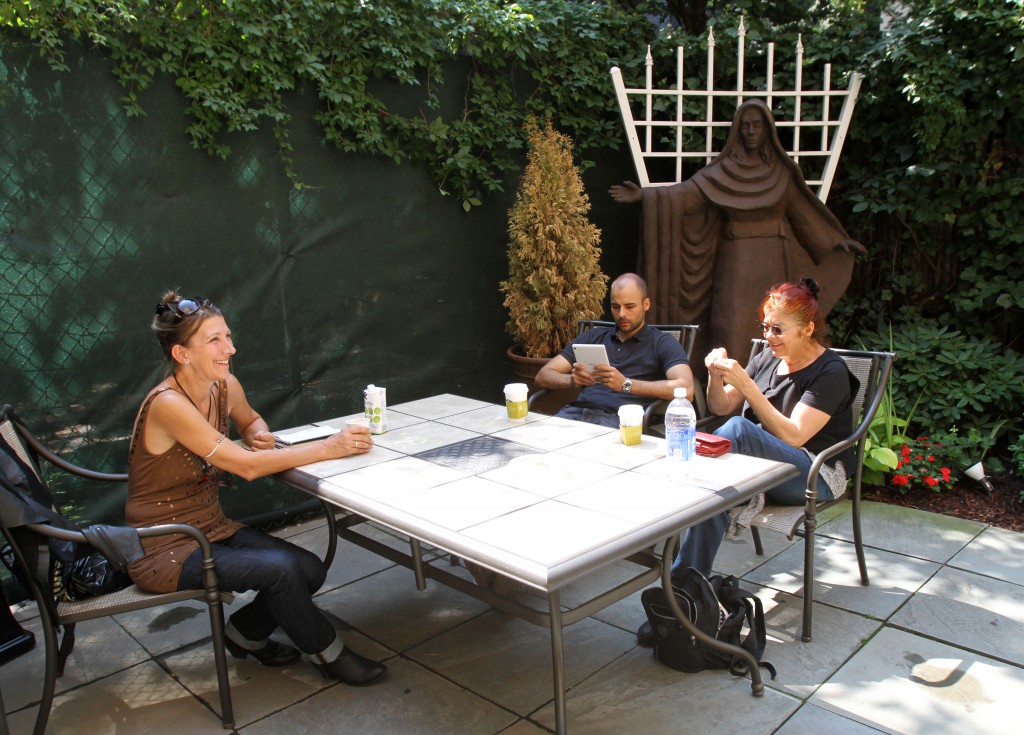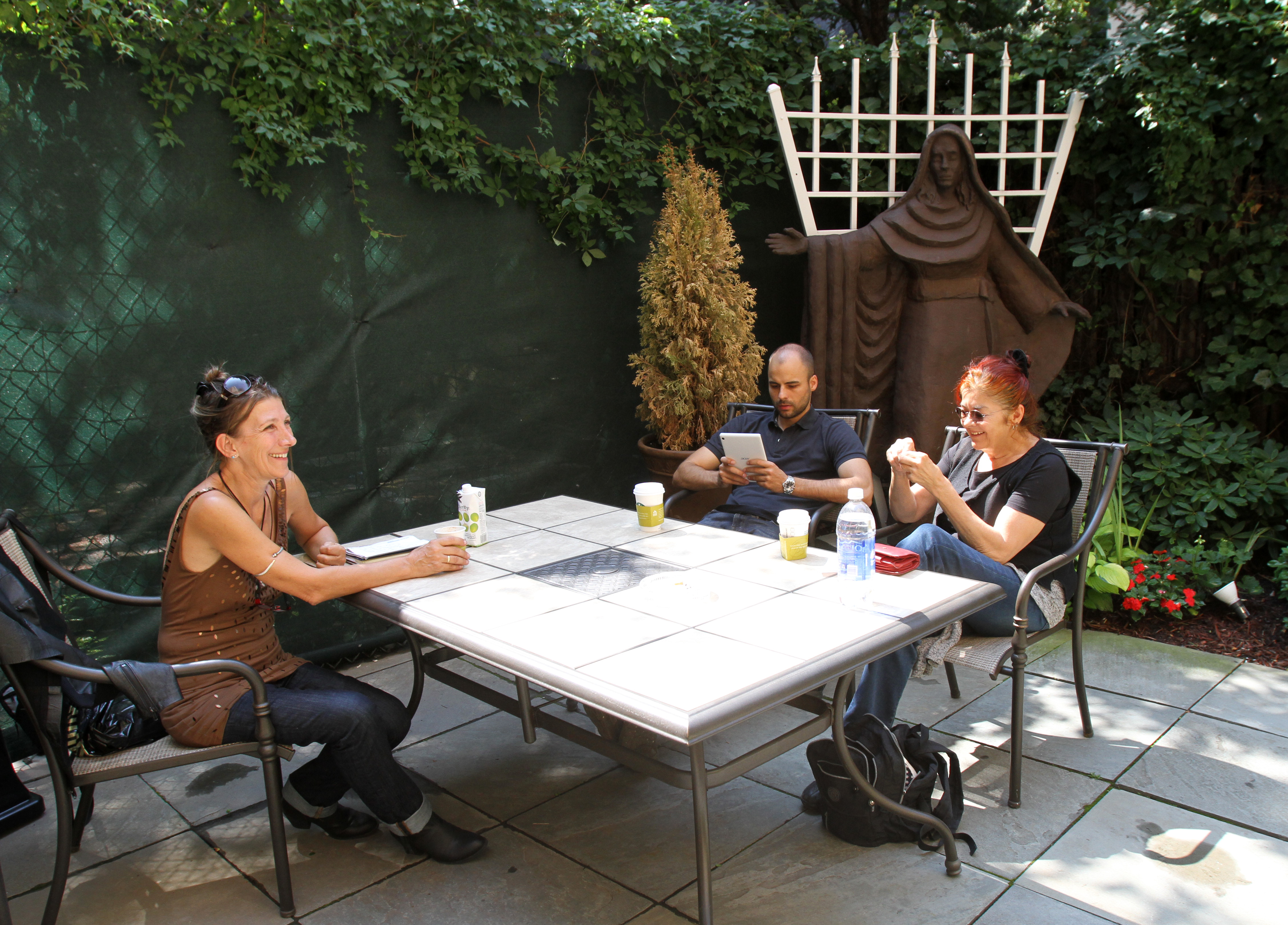
NEW YORK (CNS) — Few Manhattan hotels can claim accurately to be clean, safe and cheap, but the Leo House is all three, and a welcoming Catholic guesthouse, as well.
For $105, less than a seat at most Broadway shows, a savvy traveler can get a modest, comfortable room in the heart of the city, with Wi-Fi, a flat-screen television and access to a quiet, renovated chapel and a sunny, private garden. A hearty breakfast buffet, including freshly baked breads and an opportunity to play the upright piano, costs an additional $9.
The Leo House is open to all travelers. Executive director Frank Castro says its 81 single and double rooms are occupied more than 80 percent of the time. The majority of the tourists are American and some 30 percent come from Europe, South and Central America and Mexico, Castro told Catholic News Service in an Aug. 5 interview.
“We pride ourselves on Christian hospitality and we provide a quiet, safe, family-oriented environment,” he said. The group’s mission is to offer low-cost Catholic housing to clergy and religious, persons visiting the sick, students and travelers.
The Leo House relied on word-of-mouth and limited advertising until it launched a website three years ago — www.leohousenyc.com — and began in 2013 to offer rooms on internet booking sites including TripAdvisor, Expedia and RetreatFinder, Castro said.
Rooms in the eight-story building are small and tidy. All have sinks and toilets; many also have showers or tubs. Although the hotel’s common areas are decorated with religious statues, paintings and mementos, the guestrooms are faith-neutral so all visitors will feel comfortable, Castro explained.
“It’s a little less religious than it was in the past. We try to achieve a balance,” he said.
Mass is offered in a 40-seat chapel by priests who are guests. On average, Castro said there are three Masses each week. Some priests who stay at The Leo House hear confessions and offer counseling, he said.
In a nod to the hostel’s location on a busy crosstown thoroughfare, the welcome note on each clean bedspread includes a pair of earplugs in a plastic pouch.
The Leo House, which is celebrating the 125th anniversary of its establishment in New York, occupies three brownstone buildings on West 23rd Street in the Chelsea neighborhood. It was founded as a hostel for German travelers and was initially located on State Street in the southern tip of Manhattan, adjacent to the home of St. Elizabeth Ann Seton and within view of Ellis Island. Its early supporters were a German businessman, Peter Paul Cahensly, and the St. Raphael Society, an aid group for German immigrants. Pope Leo XIII made a financial donation and the guesthouse was named in his honor.
The Leo House moved to its current location in 1926 and expanded into two neighboring buildings bequeathed by members of the St. Raphael Society.
From the beginning, the Leo House was staffed by the Sisters of St. Agnes of Fond du Lac, Wisconsin. “They ran the place for a good hundred years and did everything from maintenance to front desk,” Castro said.
Four members of the congregation live at the Leo House and two of them, Sister Kathleen Ries and Sister Marilyn Ellickson, are actively involved in hospitality and development there. Laity comprise the rest of the guesthouse’s staff, including several employees who have more than 25 years of service.
The Leo House operates under the umbrella of Catholic Charities of the New York Archdiocese; the archdiocese and the Sisters of St. Agnes are represented on the hotel’s board of directors.
Castro said Catholic Charities does not contribute directly to the guesthouse’s $2.6 million budget, but employees are covered under the archdiocesan benefit program and Catholic Charities donated $10,000 to re-gild the tabernacle in the hostel’s chapel. New York Cardinal Timothy M. Dolan celebrated Mass for the rededication of the chapel May 24.
The chapel restoration is part of a major capital plan undertaken since Castro assumed the helm in 2006. A framed print of a phoenix on Castro’s office wall is a reminder that the hostel had fallen on hard times before he was hired to revive it. The old buildings were in rough shape and the operation was handicapped by outdated technology, he said.
“Making administrative and operational changes was a challenge,” Castro said. He cited large-scale building renovations, new bathrooms and elevators, electronic advances including Wi-Fi, a local area network for hotel computers, fire safety and monitored security. The guesthouse has a business center with six computers. In the same room are three vintage wooden phone booths Castro restored for cellphone users seeking privacy.
The Leo House falls into the “boutique hotel” category, Castro said, and its competition is airbnb.com, a handful of small commercial hotels and the Lutheran-run Seafarers International House. As a nonprofit, Leo House does not have to collect taxes that add as much as 15 percent to most lodging bills in New York, a considerable savings guests could use to enjoy the city’s cultural amenities, Castro noted.
On a recent summer morning, guests passed through the comfortable lobby, maps and water bottles in hand, on their way to sightseeing destinations. Some asked for help at the reception area, whose old-school mail cubbyholes are flanked by the Vatican and U.S. flags. They might have noticed that the cheerful desk clerk also monitored screens with clear feeds from 32 security cameras in and around the building.
Castro said the contemporary security system, locked front door and a strict prohibition on unregistered visitors in guest rooms contribute to the hostel’s safety.
He said he plans to expand his outreach to college, ministry and retreat groups and would like to recruit a resident priest chaplain.
— By Beth Griffin, Catholic News Service.







